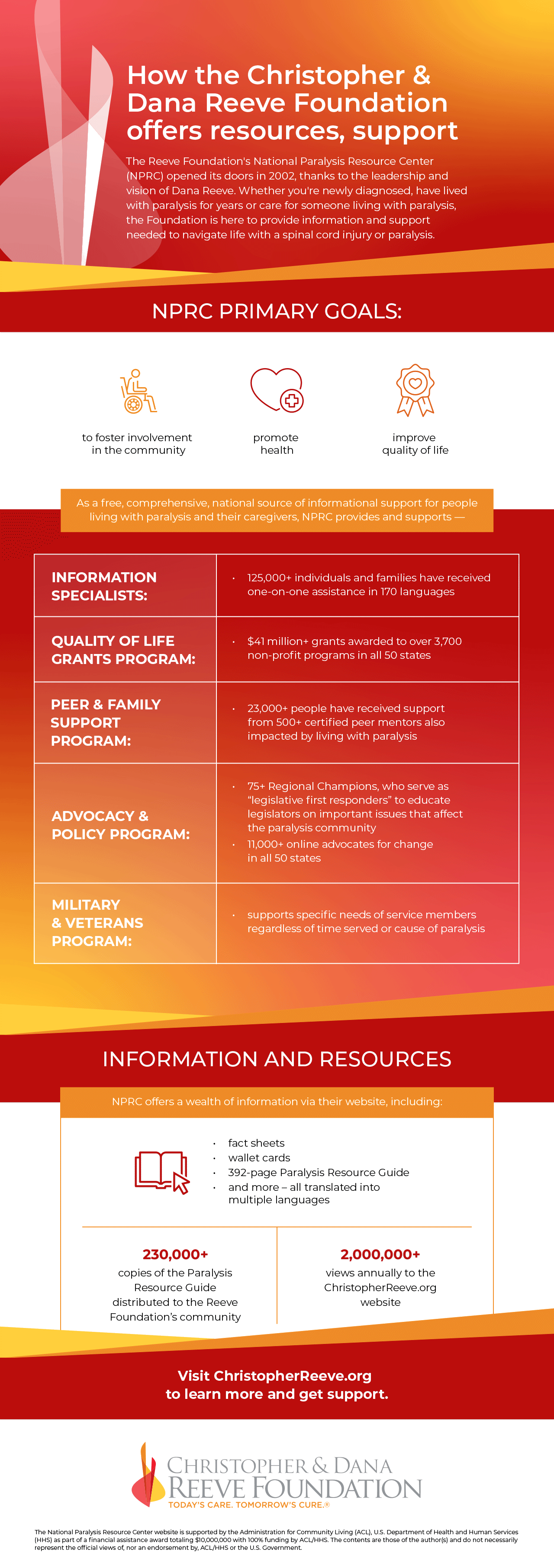2024-01-09T08:01:00
(BPT) – Did you know nearly two out of every 100 individuals live with paralysis in the United States? According to the “Living with Paralysis & Caregiver National Survey” conducted by the Christopher & Dana Reeve Foundation, a majority of Americans (69%) underestimate how many people are living with paralysis. However, one in three Americans say they know someone who is paralyzed, and one in four say they know a caregiver of someone living with paralysis — who are often family members providing care without pay, increasing the financial challenges for these families.
To help individuals and caregivers cope with the multiple challenges of paralysis, the Christopher & Dana Reeve Foundation National Paralysis Resource Center (NPRC) serves as a free, comprehensive, national source of informational support. The primary goals of the NPRC are to foster involvement in community, promote health and improve quality of life.
What is paralysis?
Paralysis is a central nervous system disorder resulting in the difficulty or inability to move the upper or lower extremities. The leading cause of paralysis is stroke (33.7%), followed by spinal cord injury (27.3%) and multiple sclerosis (18.6%). And according to the National Spinal Cord Injury Statistical Center, the estimated number of people with SCI in the U.S. is approximately 302,000, with about 18,000 new SCI cases occurring each year. Vehicle crashes are the most recent leading cause of spinal cord injury, closely followed by falls. Acts of violence (primarily gunshot wounds) and sports/recreation activities are also common causes of SCI.
Paralysis is not like any other disability or disease. It requires specialized resources to help individuals live a productive, active and full life. The breadth and depth of the NPRC staff’s knowledge spans the various causes of paralysis (stroke, multiple sclerosis, etc.), and they offer guidance on everything from what to expect in rehab, transitioning back to home, and navigating insurance and health care systems.
Programs designed to help people with paralysis and their caregivers thrive
Challenges for people living with paralysis and their caregivers range far beyond the numerous medical hurdles, including dealing with very real financial difficulties. Their households overall have lower incomes, with roughly 28% making less than $15,000 per year. This level of adversity, combined with the many emotional and social obstacles people with paralysis may face, is extremely difficult to overcome without enough support.
To help individuals living with paralysis get back into their communities and to a place of well-being quickly, the National Paralysis Resource Center draws on a wide array of information and expertise to devise personalized plans and approaches.
The NPRC offers its resources in multiple languages to support people of diverse backgrounds on topics ranging from what to expect in rehab and the best equipment exchange programs to a wealth of peer support networks nationwide. One key resource they offer for everyone is their free, downloadable Paralysis Resource Guide.
Through the NPRC, the Reeve Foundation provides a wide variety of vital free services and programs, including:
- Information Specialists who are trained to help anyone — from newly paralyzed individuals and their family members to persons who have lived with disabilities for decades as they attempt to navigate their changing world and the services available to them. Information Specialists provide individualized support and information to over 125,000 individuals and families, with the ability to respond in over 170 languages.
- Peer & Family Support Program to foster peer-to-peer support via trained and certified mentors also living with paralysis who best understand the day-to-day realities and long-term challenges that individuals living with paralysis face.
- Quality of Life Grants Program which has awarded over 3,700 grants, totaling over $41 million, in financial support to fellow nonprofits for programs or projects that foster community engagement while promoting health and wellness for individuals living with paralysis.
- Military & Veterans Program (MVP) that supports the specific needs of servicemembers and veterans, regardless of when they served or the cause of their paralysis.
- Advocacy & Policy Program is designed to empower individuals to advocate for themselves through our Regional Champions Program. Over 11,000 online advocates for change in all 50 states to champion federal legislative priorities such as housing, transportation, caregiving and insurance coverage.
- Outreach and Community Education Program seeks to improve diversity, equity, inclusion and accessibility initiatives so that underserved communities are aware of and have access to critical NPRC services. This program provides educational opportunities, community connection and cultural awareness, which are vital to ensuring that the needs of all are met.
“Giving back is the rent you pay for being on the planet.” — Dana Reeve (2004).
If you or someone you know is living with paralysis or is a caregiver for someone with paralysis, you can learn more about free information, resources and support by visiting ChristopherReeve.org.
The National Paralysis Resource Center website is supported by the Administration for Community Living (ACL), U.S. Department of Health and Human Services (HHS) as part of a financial assistance award totaling $10,000,000 with 100% funding by ACL/HHS. The contents are those of the author(s) and do not necessarily represent the official views of, nor an endorsement by, ACL/HHS or the U.S. Government.


